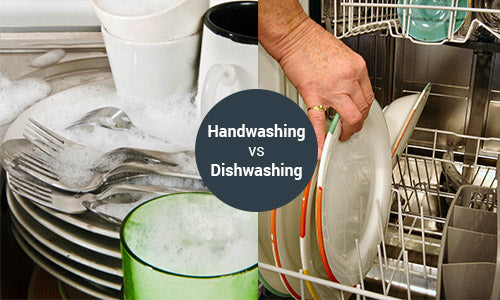
Washing Dishes By Dishwasher or By Hand--Which is More Effective?
Ever since Neanderthals introduced the first front-loading dishwashers to caves 80,000 years ago, the debate rages on about whether scrubbing dinner plates is more effective by hand or by machine. Okay, maybe the dishwasher became mainstream later than that. We’ll try the 1960s. But still, it’s a curious question: Who’s the better post-dinnertime cleaner-upper, a sponge or an appliance?
There isn’t one surefire answer to that question. It depends on what you’re looking to get out of your washing experience. Let’s weigh the pros and cons of both.
Benefits of the Dishwasher Appliance

- Dishwashers save time, money and water. Energy Star touts the benefits of an Energy Star-certified dishwasher: it could annually save you $40 in utility bills, 230 hours of work and 5,000 gallons of water. (Note that these figures may be high, as a 2008 government audit by the U.S. government found some of Energy Star’s energy savings calculations to be exaggerated.)
- Dishwashers are less wasteful. Multiple studies have found that people overuse running water when hand-washing dishes. A 2002 German study found that humans use six times more water than a machine. True, everyone uses different amounts of water when they turn a faucet, so not every person turns the kitchen into a water park. But collectively, humans use significantly more.
- Dishwashers don’t spread germs. The sponges and rags people use to wipe dishware are bacteria havens. A 2013 study by researchers in England found dishcloths and sponges were the filthiest surfaces in the kitchen, with 86% moderately or heavily contaminated with bacteria, including E. coli and staph.
- Dishwashers kill more bacteria. Dishwashers kill more bacteria because they can pump hotter water than our sinks. Dishwashers rinse at around 130-140°F. To prevent scalding, faucets are often capped at a less germicidal 120°F (hand-washing at 140°F would burn your skin in six seconds). The cooler sink water still cleans the dishes but it works less effectively.
Benefits of the Hands

- Annual money and energy savings dishwashers produce are up for interpretation. A 2009 study by researchers at the University of Alberta found that the time and money saved in Canadian households by using a dishwasher was reallocated to leisure activities that used household energy or cost money.
- Hand-washed dishes don’t turn foggy. Internal dishwasher problems can leave dishes foggy. HowtoCleanStuff.net states causes for fogginess could include cold water, a drain clog, or a lack of anything to clean. (In the last case, the powerful detergent will scratch the dishes’ surfaces if there isn’t a mess to fight.)
- Hand-washed dishes never reek. A meal can become unappetizing when your bowl has a rancid smell. When food builds up in a dishwasher and rots, the water will splash the odor onto the dishes, according to Seventh Generation.
- Dishwashers can’t clean every kitchen item. Huffington Post says items that need to be gently scrubbed by hand to avoid damaging them include knives, wooden utensils, cast iron cookware, china, disposable aluminum and anything hand-painted.
- Owning a dishwasher requires taking more caution. Although rare, children have been hospitalized for serious injuries caused by consuming corrosive dishwashing detergents. A small number of people have died from falling on knives in open dishwashers, too. Any appliance adds an extra need for responsibility in the home, and sometimes we forget to take those easy but crucial steps to protect those around us.
You Tell Us
Both sides make this debate too close to call, so tell us what your preferred method is. Do you have any techniques for getting those plates and bowls sparkly? Let us know in the comments below.

 Protect & Save with SuperFreak.
Protect & Save with SuperFreak.